#and the straight/LGBTQ spec male readers here
Explore tagged Tumblr posts
Text
Sometimes I have real life occurrences and realize how fucking crazy and annoying it is to have ppl weirdly bothering you. Let alone having a full blown STALKER and potential kidnapper on ur ass at all times.
Like NOOOOOO BITCH STOP FUCKING LOOKING AT MY SOCIALS AND ACTIN LIKE "Oh ik her. I've seen her a few times blah blah blah," Motherfucker if you don't get ur oogly googly creepy ass out of here acting like I fw you then I will make sure ur balls r crushed like water balloons on a hot fuckin summer day.
Like Like ughhh how DARE HE FOLLOW ME ON OTHER SOCIALS TOO NOOOOOOOO BLOCKED BLOCKED FOREVER
I hate ppl. Especially MENNNN ARGHHAGRHHH
I feel like I'm allowed to crash out on this blog sometimes bc let's be honest, if ur reading yandere along with me here, we're all a little screwy anyway. Cheers to hating creepy men and keeping things fictional 25/8.
#nana talks#yandere but not actual content#rant??#yes bc WHO TF DOES HE THINK HE IS#Anyways hes irrlevent#i luv the girls and the gays#the genders#and the straight/LGBTQ spec male readers here#also im not in danger lol#just some npc that acts like we like that??#like no fuck u idc if im being mean#go fuck urself#idk him fr
10 notes
·
View notes
Text
SHADOW’s Queer Coding
I first started exploring this idea of Sk8′s implicit queer rep (as in stuff other than explicit same sex intimacy) in this post.
I know we like to joke that Hiromi is the Token Straight of the protag gang, but I argue that he’s as much an example of queer rep as any of our main characters, albeit in a less conventional and fanservicey way.
So that’s what this post is gonna be, an analysis of Hiromi/SHADOW as a queer figure, how his character fits the Jekyll/Hyde archetype as a metaphor for queerness and The Closet, the similarities between SHADOW as a skatesona and early drag, and how his character represents a larger problem of exclusion within queer fandom spaces.
The 1886 Gothic novella The Strange Case of Dr. Jekyll and Mr. Hyde by Robert Louis Stevenson is the origin of the phrase “Jekyll and Hyde”. What I’m calling the Jekyll/Hyde archetype, refers to the same thing; it refers to duality, to a character who is “outwardly good but sometimes shockingly evil” (as described from the novella’s wiki page).
And the Jekyll/Hyde dynamic has also long been associated with Queerness. The antagonism between Jekyll and Hyde as two sides of the same person resonates with many people as similar to the experience being in the closet, and many many scholars have written about this queer reading of Jekyll and Hyde. Do a quick google search if you don’t believe me.
Hiromi experiences his own Jekyll/Hyde duality through his SHADOW persona, which seems to entirely contradict with Hiromi’s day to day personality.
Whilst Hiromi is sweet, romantic, and generally very cutesy, SHADOW is mean-spirited, sadistic, described as “the anti-hero of the S community.” And though these two personalities seem entirely at odds, SHADOW doesn’t exist in a vacuum, he’s very much a part of Hiromi. In the show, this manifests as SHADOW’s sabotage moves being all flower themed, as Hiromi works in a flower shop, and how he’ll “step out” of character when playing babysitter to the kids.
Below is passage from an essay titled, “The Homoerotic Architectures of Strange Case of Dr. Jekyll and Mr. Hyde” which reminds me a lot of Hiromi’s character, such that I think his character arc can be read as an allegory for coming out and self acceptance.
The closet, here, is a space not only for secrecy and repression, but also for becoming; it is the space in which queer identities build themselves up from “disused pieces” and attempt to discover the strength needed for presentation to the world. The closet is both a space of profound fear and profound courage—of potentiality and actualization. (Prologue)
Unlike the kid/teen characters, the show’s adult characters all lead double lives. When they aren’t skating, they have day jobs. Kaoru is a calligrapher, Kojiro is a restaurant owner, Ainosuke is a politician/businessman (but tbh his job is just being some rich dude), and Hiromi works in a flower shop.
But of the adult protagonists (so not Ainosuke), Hiromi compartmentalizes the most.
Kojiro leaves his face totally exposed such that he can be recognized both on and off the skate scene. Kaoru at least covers his face, but his trademark pink hair and constant use of Carla doesn’t make it very hard to connect the dots between him and CHERRY. He’s also always with Kojiro in the evenings, so if you don’t recognize him as CHERRY when he’s on his own, you certainly will when you see him interacting with Kojiro/JOE.
Next to these two, Hiromi seems the more adamant at separating his Work from Play.
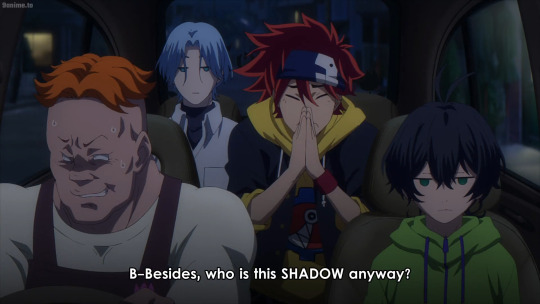
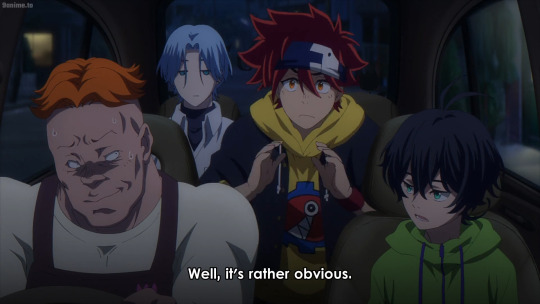
Even when he’s been clearly found it, he still tries to deny that he and SHADOW are the same person. Miya even uses this to coerce Hiromi into helping him and the boys:
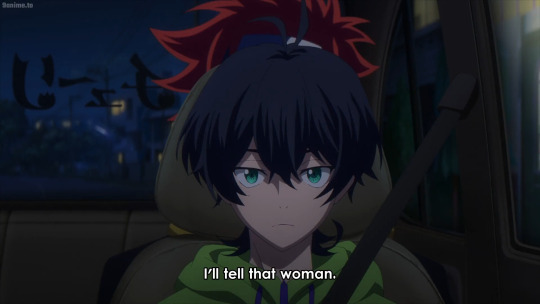
I don’t think it’s a stretch to say that the separation between Hiromi and SHADOW can be interpreted as a metaphor for being in The Closet. As SHADOW, he leads a secret life, one characterized by an tight-knit underground community with a vibrant night scene, where he behaves in ways typically frowned upon by larger society. He worries about being found out and judged by the people close to him.
But in Ep 4, the walls of his Closet begins to come down, or in this case is literally imposed upon by other members of his community, by its younger members, who don’t feel the same need to hide their passion for skateboarding or lead the same kind of double life.
We then see the line between Hiromi and SHADOW begin to blur.
He becomes less of an antagonist, and instead the audience sees him become a mentor and “mother hen” figure for the younger skaters. Later on in Ep 4, we see him casually interacting with the other protags in full SHADOW mode, not as an “anti-hero” but as a friend. In Ep 6, he acts as a babysitter for the kids, and we see him totally comfortable appearing both in an out of his SHADOW persona throughout their vacation.
And I think that this gradual convergence of Hiromi and SHADOW will culminate in this tournament arc.
There’s something more personal that’s driving SHADOW to do well in this tournament. It’s not just for bragging rights or his pride as a skater, but the results of this tournament is going to have some kind of greater impact on Hiromi’s personal life. Personally, my theory is that Hiromi is using this tournament to prove to himself that he’s worthy enough to ask his manager out on a date.
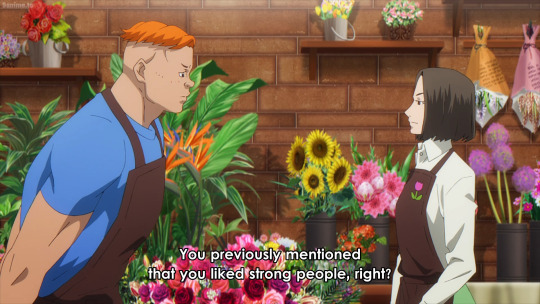
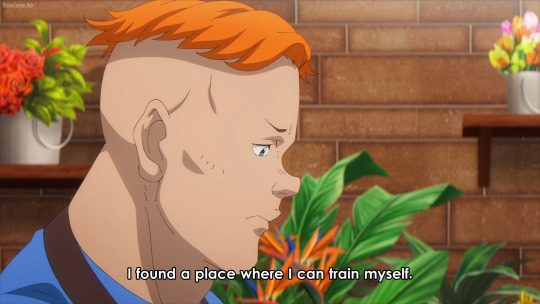
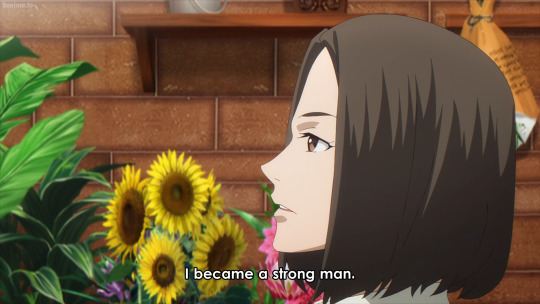

Hiromi is no longer compartmentalizing, his two lives are overlapping and influencing each other. Recall the essay quote I cited earlier:
The closet... is the space in which queer identities build themselves up from “disused pieces” and attempt to discover the strength needed for presentation to the world... of potentiality and actualization.
This is exactly the case for Hiromi. Through skating, he is piecing together the disparate parts of him such that he can present himself to the world as a more unified and confident being.
And the show presents the very skating community that Hiromi has been working so hard to keep separated from his personal life- Reki, Langa, Miya, Kaoru, and Kojiro- as the catalyst for that becoming.
That, my dear readers, is queer coding if I ever saw it.
But there’s probably gonna be people claiming something along the lines of “But SHADOW can’t be queer rep because he’s Straight!” And I assume that’s because he shows romantic interest in his female manager.
First of all, Bisexuality. Also Ace/aro-spec people. And second of all, SHADOW is Hiromi’s drag persona.
And before anyone can say anything about how Hiromi can’t do drag because he’s straight (assumption) and cis (also an assumption) uhhhh no, fuck you.
Drag didn’t start with RuPaul’s Drag Race, that’s just how it got mainstream. And it’s also how it got so gentrified and transphobic. You heard me. But anyway.
Drag is, and has always been, first and foremost about exaggerated, and oftentimes satirical, gender presentation and performance. It’s about playing with gender norms through artistic dress and theater, not so much to do with sexuality or gender identity.
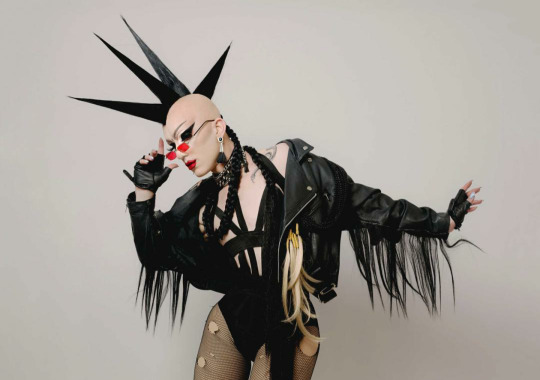
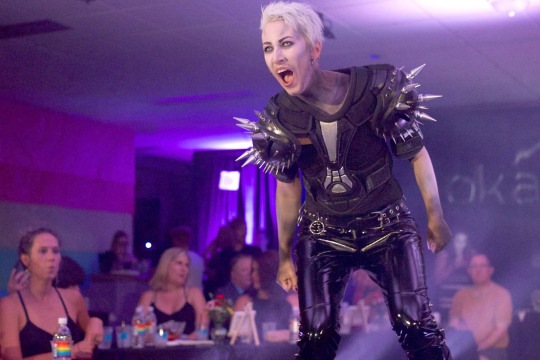
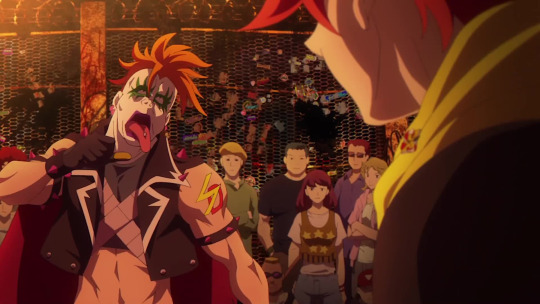
Literally, what’s the difference here?
SHADOW is a persona of exaggerated masculinity with a punk aesthetic. Regardless of his sexuality or gender identity, Hiromi’s gender performance as SHADOW is drag- that makes him queer representation, change my fucking mind.
Queerness is more than same-sex romance, and by extension, good queer representation is not limited to canonized gay ships. The very word Queer, in it’s ambiguity, is meant to encompass the richly unique experiences of everyone within the LGBTQ+ community.
In my opinion, Queer =/= Gay. I mean, they’re colloquially the same yes and even I use them interchangeably. But for the purpose of this post, they’re not the same, and that’s to argue that Hiromi/SHADOW’s lack of acknowledgement as queer rep illustrates a larger issue of exclusion within fandom.
I mean, this is something we all kinda been knew, but in the case of Sk8 specifically, there are a two main reasons why I think Hiromi is rarely acknowledged as queer rep.
1. He’s not shippable with another male character
Fandom favors mlm ships when it comes to what’s considered good queer rep. And the ultimate mark of good queer rep is explicit acts of romance or intimacy between two male characters. Unlike with any of the other characters in the show, we can’t point to Hiromi and automatically clock him as gay, especially because he expresses romantic interest in a woman.
So by default, he’s less popular, because “Ew Straight People” amirite /s.
2. He’s not attractive
This is really interesting, because like JOE, Hiromi is a beefcake.

But fans don’t thirst over him the same way they do over JOE. Granted, the show really plays up JOE’s muscles in a very strip-teasey way that literally encourages viewers to find him attractive. By contrast, Hiromi is pretty much covered head to toe and he paints his face in theatrical makeup- the point is to look scary, not attractive.
In essence, even though Hiromi engages in “queer behavior” through his SHADOW persona, his queerness isn’t palatable.
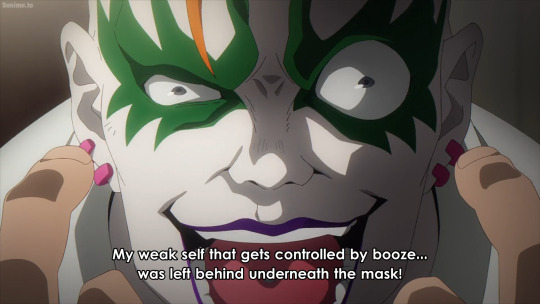
But I also think there’s some pretty insidious undercurrents of fetishization going on here, of both Asian people AND gay men. Which is... a whole other thing I really don’t have the capacity to unpack completely.
But basically, Hiromi doesn’t fit into any of the popular BL archetypes so he’s less likely to recognized as Queer. Relatedly, he’s also less often subjected to a fetishistic gaze as other characters. I mean...
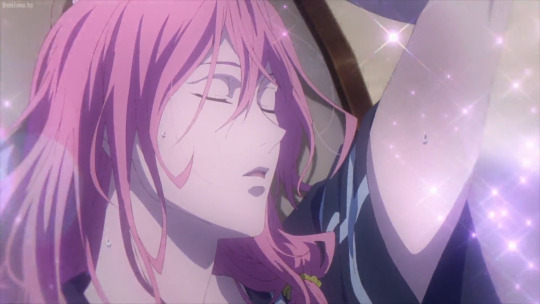
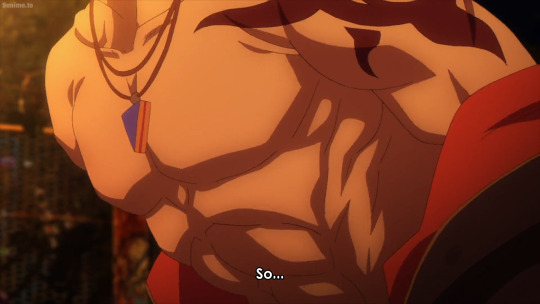
So again, fans just don’t find him as appealing. Attractive characters are always more popular than ugly ones.
And I’m sure there are a lot of people who just don’t care for Hiromi’s personality, that’s fine, he does act like an asshole sometimes. But this post is meant to illustrate that queer rep takes multiple forms, and unfortunately I think a lot of media just tends to fall back on stereotypical portrayals of queer people for the sake of broader appeal. And by consequence, the fandom’s idea of what constitutes queer rep narrows to same-sex romance, usually between two cis gay men.
With the release of Ep 9, I know a lot of people queer people are going to find representation in the Kojiro’s whole “unrequited love” thing. But personally, I feel more represented by Hiromi, his journey of self-acceptance and subversive relationship with gender- that’s what resonates with me as a trans person.
And I think it’s important to see that kind of less palatable type of queer representation more acknowledged in fandom, and in Sk8′s fandom especially, because I know the demographics of this fandom lean heavily queer.
But that’s all for now, lemme know what you guys think :)
#if there are typos forgive me i'm tired#i've been sitting on this take for a number of weeks now#i rlly hope i'm big braining rn#and not just like#yelling into a void#i love hiromi#yall Sleeping on my mans#hav u seen his leather clad ass???#bodacious#sk8#sk8 the infinity#sk8 theory#sk8 meta#sk8 spoilers#sk8 shadow
185 notes
·
View notes